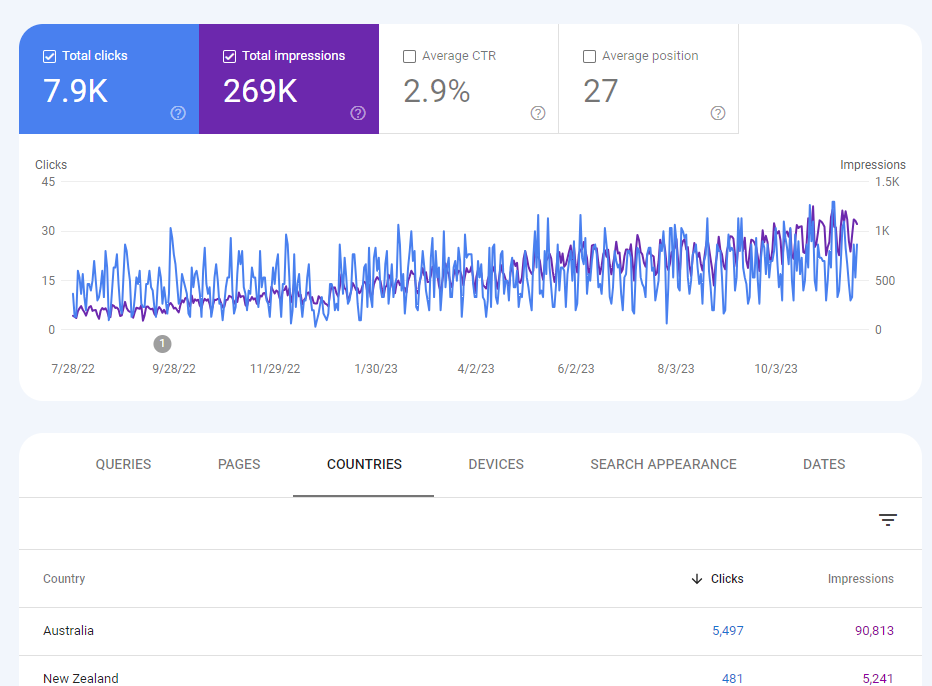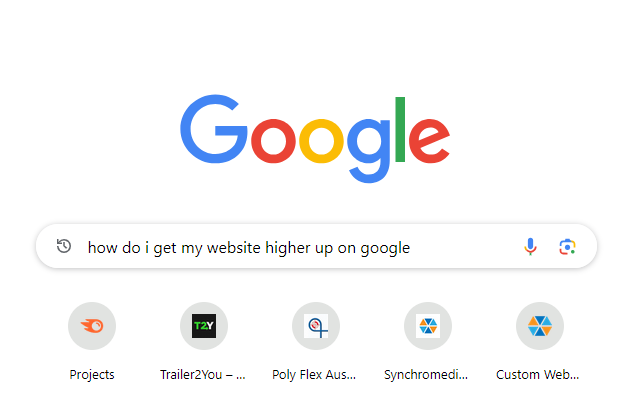Understanding SEO can seem confusing to the uninitiated. This article explains in simple terms what SEO is, how using SEO as part of a website marketing strategy can drive traffic and conversions for businesses, some practical search engine optimisation tips, and a discussion around using SEO as a website growth strategy.
SEO Definition
SEO is short for Search Engine Optimisation.
Search Engines are websites that employ sophisticated algorithms to find the most relevant results from a search query. Search Engine Optimisation is the process of creating or optimising your website to rank well for search phrases related to your business products or services.
Understanding Search Engine algorithms and how they rank websites and using this knowledge effectively results in higher search engine rankings, preferably on the first page. The goal is to attract targeted website visitors to your website, who then convert into sales for your business.
Search Engine Optimisation acts like a sophisticated librarian for the internet. When you conduct an online search using search engines like Google or Bing, these platforms deploy algorithms to sift through and prioritise countless web pages. The art of SEO involves fine-tuning your website to appeal to the algorithm’s criteria, aiming to elevate your website’s position in search results and enhance its visibility to potential visitors.
Why is SEO important for Search Engine Rankings?
SEO’s significance cannot be overstated. It directs your ideal audience to your website, supporting your goals, whether they involve sales, promotion, or education. By enhancing your webpage’s quality, authority, and user experience, SEO makes it more relevant and appealing to search engines and users, helping it rank better in search results.
SEO Optimisation Explained
SEO optimisation refers to the refinement of various elements to maximise a website’s functionality and effectiveness for search engines. Refinement involves aligning your content and technical setup to the criteria used by search engines like Google to identify the most pertinent results for any given query. This comprehensive approach is the hallmark of SEO optimisation.
How does SEO work?
SEO functions by balancing the needs of both users and search engines. It comprises two critical components: on-page and off-page SEO. On-page SEO targets what you can control directly, such as content, titles, URLs, images, keywords, and meta tags. Off-page SEO involves external factors like backlinks, social media engagement, and other activities that contribute to your site’s reputation and visibility and help grow your business.
What are some SEO best practices?
Effective SEO strategies include conducting thorough keyword research, creating compelling and relevant content, and optimising every element of your webpage—from titles and meta tags to URLs and images. Additionally, building a network of internal and external links can significantly boost your site’s trustworthiness and domain authority. Regularly monitoring your site’s analytics helps refine these strategies further.
What are some SEO challenges?
SEO is dynamic, requiring ongoing adaptation to new competitive landscapes and algorithm updates. Challenges include maintaining a high ranking amidst intense competition and shifting user preferences. Staying informed about industry trends and continually adjusting your strategies are crucial for avoiding positional penalties and ensuring your site meets evolving search engine standards.
What are the benefits of SEO, and is it worth investing time and money?
Investing in Search Engine Optimisation is critical in any long-term website marketing strategy. Although it requires time and effort, typically a 6 to 12-month commitment to see substantial improvements, the strategic advantage and increased site traffic and conversions can significantly outweigh the initial costs.
How long does it take to see results from SEO?
Through on-site optimisation, user experience and conversion rates can improve almost immediately. However, climbing the search engine rankings is a more gradual process influenced by the intensity of your SEO efforts and the actions of your competitors. SEO campaigns such as SMG’s Website Marketing Growth Plans typically require an initial 12-month concentrated strategy to ascend the search engine rankings and drive traffic. Ongoing SEO is necessary to maintain the initial gains, especially if your competitors are proactive in the market.
How can you learn more about SEO?
Have you heard of Google? The internet is a wonderful resource for educating yourself about SEO and understanding its role within any website marketing strategy. SMG can help you with the finer details and how they relate to your website and website marketing goals.
What do SEO specialists and consultants do?

SEO specialists and consultants focus on analysing, reviewing, and implementing website changes to optimise for search engines. Optimisation means maximising the traffic to a site by improving page rank within search engines. Strategies used by search engine optimisation consultants include:
Conduct Keyword Research and identify relevant and effective keywords your prospective customers are likely to use when typing in a search for products or services similar to yours.
Website Audits to assess your website and identify issues and opportunities for improvement in both technical SEO (like site structure and page speed) and content SEO (like content quality and keyword optimisation).
On-Page Optimisation ensures that elements on your site, such as title tags, meta descriptions, header tags, and images, are optimised to improve visibility.
Content Strategy that aligns with your overall website marketing strategy and SEO goals, ensuring that content is engaging, relevant, and optimised for key search terms.
Link Building to acquire high-quality backlinks from other reputable websites to boost your site’s authority and ranking.
SEO Analytics to track, analyse, and report on SEO campaigns’ performance, using tools like Google Analytics and Google Search Console to refine strategies.
Staying Updated to keep up with SEO industry trends and Google algorithm updates and adapt strategies accordingly.
How do I get my website higher on the search engines?

You can employ a mix of proven SEO strategies to elevate your website’s position in search engine rankings. Here are some key actions:
Optimise Website Structure: Ensure your website is constructed in a search engine-friendly way, including using a logical hierarchy for your information and making it mobile-friendly.
Keyword Optimisation: Use relevant keywords throughout your content, including the titles, headings, and body of your pages. Make sure the keywords are incorporated naturally and apply to the topic.
Quality Content: Create high-quality, original content appropriate to your target audience. Content should provide value and engage readers.
Meta Tags: Formulate compelling meta titles and descriptions for each page. These tags can influence click-through rates from search results.
Speed and Performance: Improve your website’s loading speed as search engines prioritise faster websites. Tools like Google PageSpeed Insights can help identify areas for improvement. Our WordPress Optimised Website hosting helps your website load fast and perform better in terms of search results.
Link Building: Develop a strategy to gain high-quality backlinks. This strategy includes creating valuable content that others want to link to and engaging in outreach activities.
Regular Updates: Constantly update your website with new content and refresh old content to keep it relevant.
Utilise Social Media: Leverage social media to drive traffic to your website and improve engagement, indirectly influencing your SEO performance.
SEO Tools and Analytics: Use SEO tools to track your rankings and gain insight from analytics to optimise your strategy.
Search Engine Optimisation specialists can achieve elevated rankings of your website in search engine results by consistently implementing these strategies.
A Word About SEO and AI Algorithms.

The team at SMG in Brisbane has been delivering innovative website marketing solutions and specialist SEO strategies since 2001. During that time, the industry has undergone many changes. Leading that change is the complexity of search engine software and algorithms and, more recently, the increasing utilisation of AI technology.
AI technology is becoming integral to SEO algorithms. Search engines can quickly identify and penalise non-original content with lower rankings and are learning to detect content generated by platforms such as Chat GPT, which has significant implications for content strategy. Careful consideration must be given to developing original content that is informative and relevant to potential customers.
Underpinning any website marketing and SEO growth strategy requires careful research and analysis. This is where SMG can help. Our SEO specialists will help identify problems and opportunities for your website, formulate a growth strategy and guide you through the practical complexities of implementing your SEO campaign.
It all starts with a free initial consultation, during which we discuss your objectives and provide some initial insights into possible strategies.

